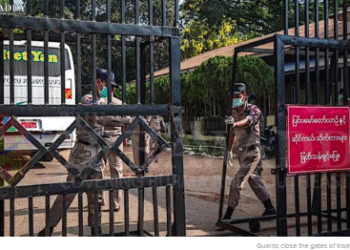Mae Sot, Thailand – Once again, the attack came from the sky.
The Kachin resistance fighters barely heard the sound of the propellers as the Myanmar military’s two drones released their payload above their heads in northern Kachin State in late April.
KEEP READING
list of 4 items
Niger, Mali and Burkina Faso military leaders sign new pact, rebuff ECOWAS
Israel war on Gaza updates: 16 killed in Israeli attack on UNRWA-run school
Sudan’s army chief says many countries ‘turn a blind eye’ to RSF crimes
‘Whoever harms us is marked for death’, Israeli PM warns Hezbollah
end of list
“I fell down to the ground when the bombs dropped,” Aung Nge, a fighter with the Kachin People’s Defense Force (PDF), told Al Jazeera from an undisclosed location. “I didn’t lose consciousness. I was awake the whole time.”
The drone attack seriously injured three men who were holed up close to the front line in Kachin State where battles with the armed forces have been escalating since October last year.
In critical condition, field medics sent the men to a hidden hospital deep in the jungle where they could be treated by professional doctors.
Within a day of receiving treatment, however, one of the soldiers started to show symptoms the doctors could not understand and his condition began to deteriorate rapidly.
Another man from the Kachin Independence Army (KIA), who had been injured in a separate drone strike days after the first attack and appeared to be on the mend with no signs of infection, also took a turn for the worse and died in his sleep.
Aung Nge, meanwhile, was about to endure ghastly infections that would spread across his entire body.
Doctors told Al Jazeera that the men experienced rapid onset necrosis, an effect not normally seen in a blast wound. Necrosis causes the deterioration of most or all of the cells in an organ or tissue due to disease or the failure of the blood supply.
While necrosis can be caused by sepsis, which appears rapidly and is usually accompanied by a fever, doctors said they could find no physiological reason for the rapid deterioration in their patients. Toxic substances can also trigger such reactions, they said.






